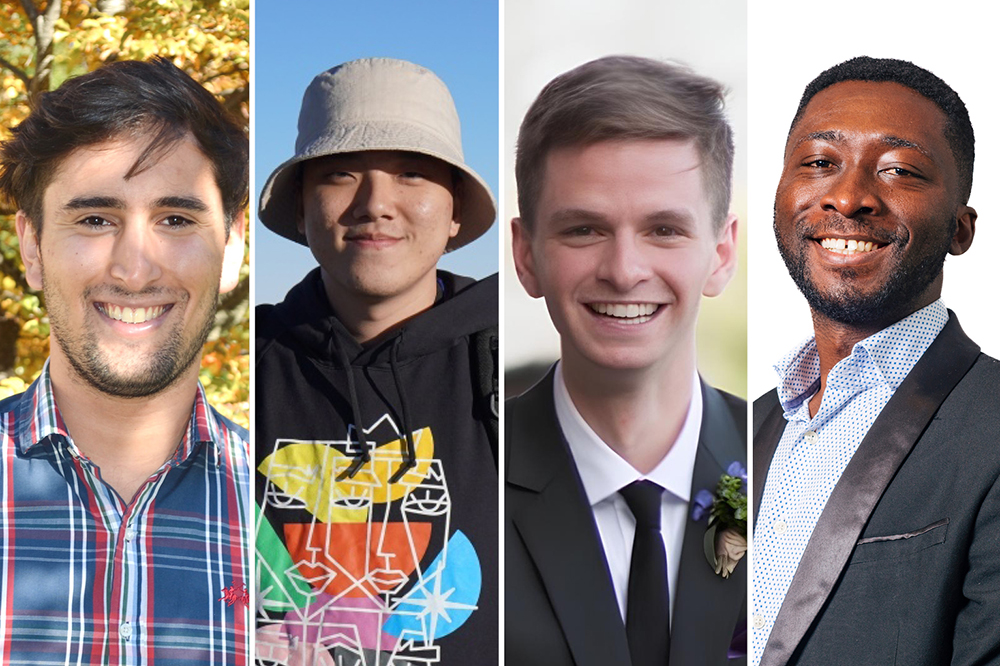
Pictured left to right: Nuclear and radiological engineering Ph.D. students Ignacio Bartol, Heechan Lee, Dimitri Margot, and Emmanuel Mate-Kole.
Four Ph.D. Students Awarded Fellowships from the Health Physics Society
July 17, 2023
By Chloe Arrington
Four postgraduates in the George W. Woodruff School of Mechanical Engineering have been awarded fellowships from the Health Physics Society (HPS) for 2023. Recipients include nuclear and radiological engineering Ph.D. students Ignacio Bartol, Heechan Lee, Dimitri Margot, and Emmanuel Mate-Kole.
Each fellowship awarded by the HPS provides support to full-time entering or continuing students enrolled in U.S. graduate programs in health physics or a closely related field. Learn more about the recipients:
Ignacio Bartol
What is the name of the award you received?
I received the Robert Gardner Memorial Fellowship Award.
Tell us about your research, and your advisor.
My research area is integrating computer vision models and computational fluid and particle dynamics simulations to enhance biokinetic models. Those models forecast the amount of radiation that the body will absorb from radioactive particles that are inhaled. To put it simply, I develop simulations of how particles and airflow interact within a realistic 3D model of the human respiratory tract. These simulations help me determine where particles will deposit in the airways, which is important information for biokinetic equations. All the work is supervised by my advisor, Assistant Professor Shaheen Dewji at Georgia Tech, and Mauricio Tano from Idaho National Lab.
Are you involved in any campus groups/clubs?
I am actively involved in three clubs at Georgia Tech: the American Nuclear Society – Georgia Tech student chapter, DSGT, and the ski & snowboard club. These clubs allow me to pursue my passion for nuclear science, my interest in data science, and my hobbies such as skiing.
What does receiving this award mean to you?
Having the honor of receiving my first award from a reputable U.S. institution was truly a momentous and fulfilling experience. The acknowledgment and recognition of my work and contributions to the field were truly gratifying. I am sincerely thankful to the HPS for providing such a prestigious recognition, and I would also like to express my heartfelt gratitude to my advisors, who generously took the time to write recommendation letters and provide guidance throughout the application process. Their unwavering support and mentorship have been invaluable to me, and I deeply appreciate their efforts.

Heechan Lee
What is the name of the award you received?
I received the 2022-2023 Health Physics Fellowship.
Tell us about your research, and your advisors.
I am a third-year Ph.D. student (recently received candidacy). My research area is low-dose radiation epidemiology focusing on residential radon. My advisor is Assistant Professor Dewji.
Are you involved in any campus groups/clubs?
I am involved in the Georgia Tech Korean Student Association and going to be the president of this association next semester.
What does receiving this award mean to you?
I consider it a compliment and encouragement for the attention and time I have devoted to the fields of health physics and radiation protection.

Dimitri Margot
What is the name of the award you received?
I was awarded the Robert S. Landauer Fellowship for graduate studies in health physics.
Tell us about your research, and your advisors.
I am a fifth-year Ph.D. student. My research area is uncertainty analysis of internal dosimetry and biokinetic modeling. My advisor is Assistant Professor Dewji.
Are you involved in any campus groups/clubs?
I am not involved with campus groups or clubs. I am actually a remote student and work from New Mexico to be near the national laboratory that is funding my research.
What does receiving this award mean to you?
I am thankful for receiving the award and for the HPS sponsoring me. Because of this, I was able to attend the annual HPS meeting to present my work. The annual HPS meeting is a great professional development and networking event that includes presentations and courses by knowledgeable and experienced people in their fields of expertise. Receiving the award has been motivating as working in New Mexico has isolated me from Georgia Tech and my peers.

Emmanuel Matey Mate-Kole
What is the name of the award you received?
I was the recipient of the 2022-2023 J. Newell Stannard Fellowship for graduate studies in health physics.
Tell us about your research, and your advisors.
I’m currently in my second year. My research is focused on Evaluation of Exposure Pathway, Internalized Uptakes, and Dosimetry for Military Personnel from Radiological and Toxic Metal Sources. Additionally, I’m involved in the enhancement of biokinetic models using physiologically based models for incorporated radionuclides. My advisor is Assistant Professor Dewji.
Are you involved in any campus groups/clubs?
I’m involved with the following campus groups/clubs: Fellowship of Christian Graduate Students, Atlanta Ministry with International Students, Ghanaian Student Association, and the ANS – Georgia Tech student chapter.
What does receiving this award mean to you?
I’m proud to be named a recipient of the J. Newell Stannard Fellowship – a fellowship named after a respectable and admirable scientist (James Newell Stannard, Ph.D.) who made significant contributions to radiation protection. I’m grateful to the health physics community for recognizing my commitment to the field. I will continue to play a pivotal role in pushing the scientific boundaries in radiation protection for the benefit of all.
About HPS
The Health Physics Society was founded in 1956 and is a scientific organization of professionals who specialize in radiation safety. Its mission is to support its members in the practice of their profession and to promote excellence in the science and practice of radiation safety. Its members represent all scientific and technical areas related to radiation safety, including academia, government, medicine, research and development, analytical services, consulting, and industry in all 50 states and the District of Columbia.
